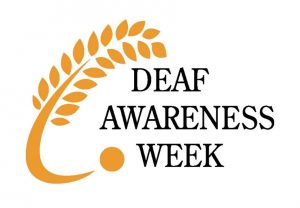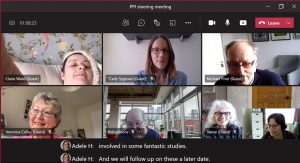May 7, 2021, by Adele Horobin
Deaf Awareness Week 2021: Coming through it together

This last year has been tough in so many ways. Already dealing with communication barriers, people with deafness and hearing loss have faced added difficulties brought by the pandemic. As we (hopefully) look forward to the situation improving, the theme for this year’s Deaf Awareness Week (3-9 May) ‘coming through it together’ is very apt.

Lipreading is an essential part of many people’s armouries to help them understand speech. But facemasks directly block this. There are things that we can all do to help, such as using facemasks with transparent panels and being more aware of what could be done to help make communication easier for people who cannot rely on their hearing.
 Carly Sygrove lost her hearing on one side suddenly 4 years ago and has set up a website, suddenhearingloss.support offering information about sudden hearing loss. Carly suggests the following tips to help make communication easier:
Carly Sygrove lost her hearing on one side suddenly 4 years ago and has set up a website, suddenhearingloss.support offering information about sudden hearing loss. Carly suggests the following tips to help make communication easier:
- First, make sure you have the person’s attention – keeping good eye contact.
- If wearing a standard facemask, lower your face mask (at a safe distance!) so your lips are visible when speaking.
- Consider the lighting and be mindful not to turn away or cover one’s mouth when speaking.
- Avoid shouting – instead, speak clearly.
- Repeat missed dialogue or try rephrasing it. Don’t say ‘It doesn’t matter’.
- Use a speech-to-text app to convert spoken words to written text.
- Use a pen and paper to write down important information.
- Be patient.
Lockdowns and the need for social distancing have meant that a lot of socialising and work have moved online. While online meeting platforms, such as MS Teams, Google Meet, and more recently Zoom, have or are making in-built live captions or subtitles available, the accuracy of them is never 100%. Image quality can also be poor, making it difficult to lipread. So, how can we make online interactions more accessible? Carly suggests:
- Enable captions (or live subtitles) for all users – check with the platform you are using for instructions on how to do this.
- Use the ‘hands up’ feature to help prevent overlapping voices (which can be difficult to decipher) and encourage one person to speak at a time.
- If it’s a large group meeting, consider dividing the main group into smaller groups, e.g. breakout rooms, so more focussed discussion can be had – easier for someone with hearing loss to navigate.
- Don’t just rely on speech in meetings, use visual cues and prompts, for example, screen sharing. You can activate captions within PowerPoint too for when you need to present slides.
- It might also be helpful to share any presentations in advance so viewers have the chance to review the content before it is presented.
- Pin or spotlight the person speaking at each point of the meeting, making that person the main focus – this can help with lipreading.
- Consider your lighting. Make sure you have good lighting and don’t sit in front of a window as this can cause a silhouette effect. If your face is clear and visible, this can help enable lipreading.
- Make use of the chat function to write down important information, but bear in mind, on some platforms, going to Chat may mean captions cannot be seen.
- If a sign language interpreter is required, they can be asked to join the meeting.
- Schedule frequent breaks – it can be tiring for everyone trying to follow a virtual meeting, particularly people with hearing loss.
- Follow the meeting up with a summary in written form, e.g. email, so all participants have access to the key points.
- Consider a coffee morning where people can check their technology is working well and ensure their communication needs are being met.
- If someone is joining a meeting who has specific accessibility requests, they should be given the option to make these known with adequate time before the meeting so that any necessary arrangements can be made.
 It’s fair to say that research has experienced a bit of a boom and bust effect from the pandemic. COVID studies have been hastily, and sometimes brilliantly, rolled out to identify effective treatments and understand more about the impact of COVID. Public awareness and participation in research has maybe never been higher. And of course, we have seen the rapid development of safe, effective vaccines which should be a real game changer in the fight against the disease. This has been a huge, global effort, the likes of which we have never seen before.
It’s fair to say that research has experienced a bit of a boom and bust effect from the pandemic. COVID studies have been hastily, and sometimes brilliantly, rolled out to identify effective treatments and understand more about the impact of COVID. Public awareness and participation in research has maybe never been higher. And of course, we have seen the rapid development of safe, effective vaccines which should be a real game changer in the fight against the disease. This has been a huge, global effort, the likes of which we have never seen before.
However, we know that in their haste, many researchers did not collaborate or consult with patients and the public in designing COVID studies, which means that we may not be sure that all COVID studies are addressing and measuring what is most important to patients. Also, the necessary diverting of NHS and research resources to combatting COVID and saving lives has meant that non-COVID research has either been suspended, delayed or has had to adapt to collecting data online. Hearing research has been no exception to this. We are, however, gearing up for research to resume more normally, and have a number of studies which are active or in the pipeline.
 The CHEAR (Covid and HEARing) study will be exploring whether COVID and/or its treatment has any effect on hearing. Some viruses can damage hearing – measles is a well-known example – so we need to know if COVID affects hearing too. CHEAR is actively recruiting participants now, so if you had, or think you have had COVID, please do get in touch to find out how you can take part. Email: charlotte.caimino@nottingham.ac.uk
The CHEAR (Covid and HEARing) study will be exploring whether COVID and/or its treatment has any effect on hearing. Some viruses can damage hearing – measles is a well-known example – so we need to know if COVID affects hearing too. CHEAR is actively recruiting participants now, so if you had, or think you have had COVID, please do get in touch to find out how you can take part. Email: charlotte.caimino@nottingham.ac.uk

The GAIN project is looking for participants too. It aims to understand and address the barriers that adults with hearing loss might face in using their hearing aids, or in using them regularly. Phase 1 of the project is now open and is looking for participants to complete some questionnaires about their hearing aid use. Contact paige.church@nottingham.ac.uk to find out more!

The FUN Study is seeking to understand more about the fatigue experienced by children with hearing loss, why children with unilateral (one-sided) hearing loss experience fatigue and investigate some current and novel measures of fatigue. It is currently looking for parents/guardians and their children who have hearing loss and are aged 6 to 16 to take part. Fill in the online query form or email bethany.adams@nottingham.ac.uk. Bethany is also looking for paediatric audiologists to take part in an interview to discuss fatigue and unilateral hearing loss.
We are also developing COACH – a clinical trial comparing hearing aids versus a cochlear implant in adults who have severe hearing loss but just miss out on being eligible for a cochlear implant under the NHS. The current research evidence does not tell us which would be better for this group of patients. We aim to change that. We are not quite ready to recruit participants yet, but you can keep in touch with developments by joining the COACH trial mailing list at: https://mailchi.mp/d4d0fff4a40f/coach
The pandemic has brought challenging times but we are looking forward to better days ahead. With a little more understanding and awareness of barriers that people with deafness and hearing loss face, we can help everyone come through this together. #DeafAwarenessWeek2021.
Please sign up to the Biomedical Research Centre database to find out more about hearing research. Thank you!
Follow us on Twitter @hearingnihr and Facebook at https://www.facebook.com/hearing.nihr
For advice and guidance on living with hearing loss or tinnitus in these uncertain times, the following links* may be of help:
https://rnid.org.uk/coronavirus-response/
https://www.tinnitus.org.uk/covid-19-guidance-for-people-with-tinnitus
Nottingham NHS hearing services https://www.nuh.nhs.uk/audiology
Online self-help for using your hearing aids http://www.c2hearonline.com/
Also check out Carly Sygrove’s new website dedicated to supporting people affected by sudden hearing loss: https://suddenhearingloss.support/
*these are external websites over which we have no control.
No comments yet, fill out a comment to be the first

Leave a Reply